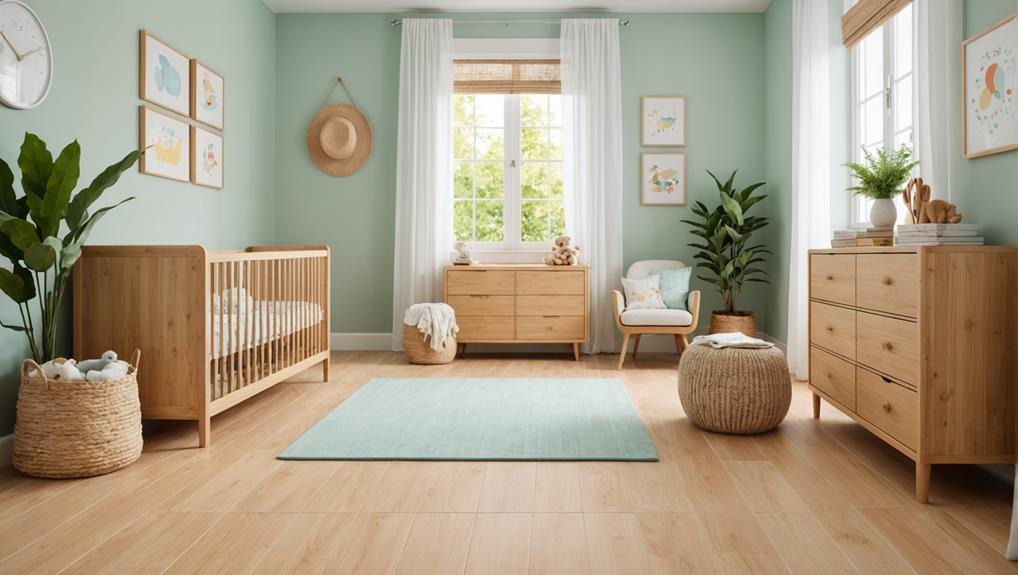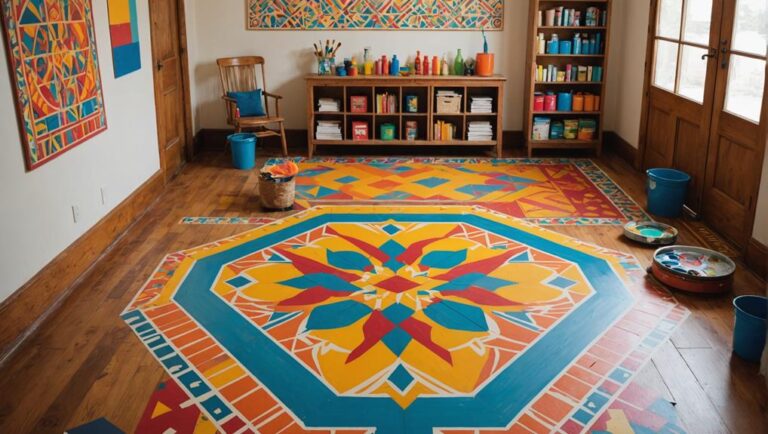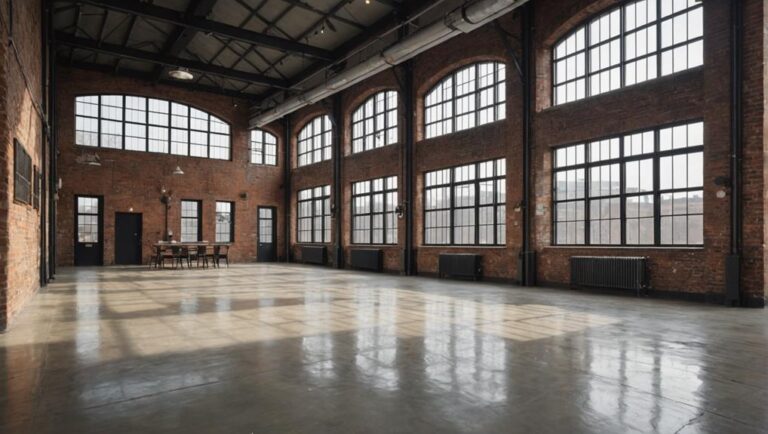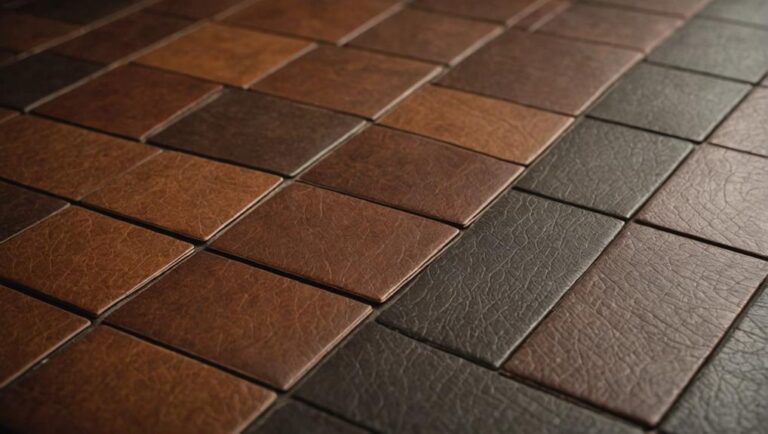Choosing non-toxic flooring for your nursery is essential for your child's health and safety. Consider eco-friendly options like cork, bamboo, or linoleum, which are free from harmful chemicals and VOCs. Cork offers a soft surface, reducing falls, while bamboo is durable and moisture-resistant. Sustainable hardwoods, like reclaimed timber, are also a fantastic choice, especially with low-VOC finishes to keep the air clean. For added comfort, natural fiber rugs can enhance the look while prioritizing safety. These thoughtful choices not only protect your little one but also create a nurturing space. Explore further options to find the perfect fit for your nursery!
Benefits of Non-Toxic Flooring
When it comes to creating a safe haven for your little one, non-toxic flooring is an essential choice that offers peace of mind. You want the best for your child, and selecting flooring that prioritizes health benefits is a crucial step. Non-toxic materials are free from harmful chemicals and volatile organic compounds (VOCs), which can contribute to respiratory issues and allergies. By opting for non-toxic flooring, you're reducing your child's exposure to these harmful substances, ensuring a healthier environment for them to play and grow.
Moreover, the environmental impact of your flooring choice cannot be overlooked. Non-toxic options, such as natural materials like cork, bamboo, or certain types of linoleum, are not only safer for your little one but also more sustainable for the planet. These materials often come from renewable sources, which helps decrease your carbon footprint. By choosing eco-friendly flooring, you're making a conscious effort to contribute to a healthier planet for future generations.
Additionally, non-toxic flooring tends to be easier to clean and maintain, which is a significant advantage when it comes to the inevitable spills and messes that come with having a little one. You can rest easy knowing that the cleaning products you use won't introduce further toxins into your home.
Hardwood Flooring Options
Hardwood flooring brings a classic warmth to a nursery, creating a welcoming space for your child to explore. Not only does it offer an aesthetically pleasing environment, but sustainable hardwood options also prioritize your family's health and safety. Look for certified woods, such as bamboo or reclaimed timber, which guarantee minimal environmental impact while providing a durable surface for playtime.
When choosing sustainable hardwood, consider species like maple or oak, known for their strength and longevity. These woods can withstand the wear and tear of little feet while being free from harmful chemicals commonly found in synthetic flooring. You'll want to confirm that any finish or sealant used is low-VOC or zero-VOC, further enhancing the safety of your nursery.
To keep your hardwood flooring looking its best, follow these simple maintenance tips. Regularly sweep or vacuum to remove dirt and dust, preventing scratches and wear. When spills occur, promptly clean them with a damp cloth to avoid water damage. For deeper cleaning, use a pH-neutral hardwood cleaner, guaranteeing it's free from harsh chemicals.
Additionally, placing area rugs can add a cozy touch while providing extra cushioning for your child. Remember, creating a safe and comfortable space is crucial as your little one grows, and choosing the right hardwood flooring is a significant part of that journey. Embrace the beauty and safety of sustainable hardwood to foster a nurturing environment for your child.
Cork Flooring Advantages
Cork flooring stands out as an exceptional choice for nurseries, offering both comfort and safety with its unique properties. Not only is it soft underfoot, making it ideal for little ones who might tumble, but it's also non-toxic, ensuring a healthy environment. Plus, cork sustainability is a key factor—harvesting cork doesn't harm the tree, allowing it to continue thriving and absorbing CO2.
Here's a quick comparison of some cork flooring advantages:
| Feature | Benefit | Importance |
|---|---|---|
| Comfort | Soft and cushioned surface | Reduces impact from falls |
| Insulation | Natural cork insulation | Keeps rooms warm and quiet |
| Sustainability | Eco-friendly harvesting | Supports environmental health |
| Hypoallergenic | Resists mold and allergens | Safe for sensitive children |
| Durability | Long-lasting and resilient | Cost-effective over time |
With its natural insulation, cork flooring helps maintain a comfortable temperature, reducing heating costs during colder months. This is especially important in a nursery, where you want to create a cozy haven for your child.
Choosing cork means you're investing in a product that's good for your family and the planet. Its sound-absorbing qualities also help create a peaceful atmosphere, letting your baby sleep soundly without disturbances. When considering flooring for your nursery, cork flooring is a fantastic option that combines safety, comfort, and environmental responsibility.
Bamboo Flooring Characteristics
If you're exploring flooring options that balance beauty, durability, and eco-friendliness, bamboo flooring deserves your attention. This renewable resource offers a unique combination of bamboo durability and bamboo aesthetics that can make your nursery both safe and stylish.
First off, bamboo is incredibly strong. It's known for its resilience, making it an ideal choice for an active space like a nursery. Unlike traditional hardwoods, bamboo can withstand the wear and tear of little feet—and let's face it, spills are inevitable! When properly treated, bamboo flooring is also resistant to moisture, making it less susceptible to mold and mildew, which is essential for maintaining a healthy environment for your child.
On the aesthetic side, bamboo flooring comes in a variety of colors and finishes. Whether you prefer a light, airy look or a richer, deeper tone, there's a bamboo option that can match your vision. Its natural grain patterns add a touch of sophistication, turning your nursery into a warm, inviting space.
Moreover, many bamboo products are available as non-toxic options, ensuring that harmful chemicals won't compromise your baby's safety. Opting for formaldehyde-free adhesives and finishes can help you create a nurturing atmosphere.
Carpet Alternatives for Nurseries
When it comes to creating a cozy and safe nursery, opting for carpet alternatives can be a smart choice. Carpets may seem soft and inviting, but they often harbor allergens and harmful chemicals that you don't want around your little one. Instead, consider eco-friendly materials that are not only safer but also stylish and practical.
One great option is natural fiber rugs, such as jute or sisal. These materials are biodegradable and free from synthetic dyes, making them a healthier choice for your nursery. Plus, their textured surfaces provide a unique look while being durable enough to withstand the wear and tear of tiny feet.
Another alternative is cork flooring. Known for its natural insulation properties, cork is soft underfoot and naturally resistant to mold and mildew. It's also an eco-friendly material, harvested from the bark of cork oak trees without harming the tree itself. You'll love its warmth, and it's easy to clean—just a quick sweep or mop will do!
If you want something more cushioned, consider rubber flooring. Available in various colors and patterns, it's not only slip-resistant but also offers excellent stain resistance, making it perfect for those inevitable spills.
With these carpet alternatives, you can create a beautiful, safe haven for your baby while prioritizing health and sustainability. Your nursery will be both inviting and worry-free, allowing you to enjoy those precious moments together.
Frequently Asked Questions
How Do I Clean and Maintain Non-Toxic Flooring?
Imagine you just installed beautiful cork flooring in your home. To keep it looking great, you'll want to use gentle cleaning techniques, like a damp mop with mild soap. Avoid harsh chemicals! For maintenance tips, regularly sweep or vacuum to remove dirt and dust, and consider applying a natural sealant every few years. This'll help protect your flooring while ensuring a safe environment for your family. You've got this!
Are There Any Eco-Friendly Certifications for Flooring?
When searching for eco-friendly flooring, it's essential to look for eco labels that indicate sustainable materials. These certifications highlight products made with renewable resources, ensuring your choice supports the environment. You'll want to prioritize labels like Greenguard, FloorScore, or FSC, which verify low emissions and responsible sourcing. By understanding the eco label importance, you can confidently select flooring that's not just stylish, but also safe for you and your family's health.
What Is the Average Cost of Non-Toxic Flooring Options?
When it comes to flooring, think of your budget as a garden; it needs nurturing to flourish. The average cost for non-toxic options like bamboo flooring ranges from $3 to $8 per square foot, while cork flooring typically sits between $4 and $10. Both materials not only provide a safe environment but also add a touch of natural beauty to your space. Investing in these options guarantees a healthy haven for you and your loved ones.
How Long Do Non-Toxic Flooring Materials Typically Last?
When considering how long non-toxic flooring materials typically last, you'll want to look at durability comparison and material lifespan. Generally, sustainable options like bamboo or cork can last 20-30 years with proper care. Hardwood can also be a great choice, lasting even longer if maintained well. While these materials are eco-friendly, their longevity guarantees you're investing in a safe, durable surface for your space, providing peace of mind for you and your loved ones.
Can Non-Toxic Flooring Help Reduce Allergies in Children?
Yes, non-toxic flooring can greatly help reduce allergy triggers in children. By minimizing harmful chemicals, you're improving indoor air quality, which is essential for little ones sensitive to allergens. Non-toxic materials often resist mold and dust mites, common culprits in allergic reactions. Choosing such flooring creates a healthier environment, allowing your child to breathe easier and play safely. It's a proactive step towards ensuring their comfort and well-being at home.




